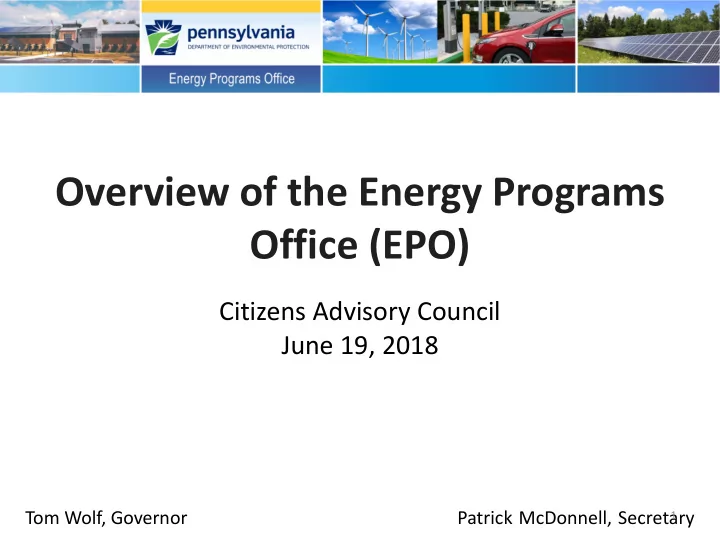

Overview of the Energy Programs Office (EPO) Citizens Advisory Council June 19, 2018 Tom Wolf, Governor Patrick McDonnell, Secretary 1
DEP’s EPO Purpose and Mission The Pennsylvania Department of Environmental Protection’s Energy Programs Office (EPO), Programs Deputate, is the primary entity under the Governor’s jurisdiction for program deployment and outreach for: • The benefits of clean energy and energy efficiency programs in Pennsylvania • Advocacy and deployment of clean alternative fuels • Supporting a diverse energy portfolio that includes indigenous energy resources The PA Energy Office supports energy policies and programs that prevent pollution, protect our environment, improve public health, and ensure access to affordable energy options for all Pennsylvanians. 2
DEP’s EPO Mission Continued Our shared approach to our mission focuses on: • Conservation and Efficiency • Advanced Technologies • Energy Security and Resiliency (Energy Assurance) • Education and Outreach 3
DEP’s Energy Office Responsibilities • Renewable Energy • The primary entity for support of alternative energy programs. • Energy Efficiency and Conservation • The primary entity for outreach and awareness of energy conservation and energy efficiency. PA owned / operated facilities Lead by Example • goals Climate • • The primary entity supporting the development of energy workplans to reduce emissions impacting climate change. 4
DEP’s Energy Office Responsibilities • Alternative Transportation • The primary entity for the administration of programs to support and promote the use of alternative fuels and innovative transportation technologies which reduce emissions from mobile sources. • Education/Outreach/Collaboration • Primary entity for the provision of subject matter expertise to lead or support energy focused programs to inform and educate PA citizens on clean energy benefits on the environment, economy and health. 5
DEP’s Energy Office Responsibilities • Energy Assurance • The primary entity for programmatic support of Commonwealth’s Emergency Support Function #12 “energy emergency” and for monitoring energy supply and demand 6
DEP’s Energy Office Structure Organization Chart • C.O. - 12 positions • 9 Program staff (three vacancies) • R.O. Staff - 6 positions • 5 Program Staff (one vacancy) • 7
EPO Organization Chart Director Environmental Environmental Administrative Program Group Manager Officer Manager Mechanical Environmental Energy Progm Engineer Clerk Typist 3 Group Manager Spcst Consultant Air Qlty Prgm Energy Progm Spcst Spcst Energy Prgm Energy Progm Spcst Spcst Energy Prgm Energy Program Spcst Spcst Energy Prgm Energy Program Spcst Spcst Energy Prgm Spcst Sr. Civil Eng Gen 8
EPO Budget EPO Staff Funding (Approx. $1.3 million) EPO State Staff Funding PEDA CFA 7% Federal 3% 19% Sunshine 2% General Fund State 88% 81%
DEP’s Energy Office Funding Sources • State Energy Program (~$1.5 Million/Year) • Used to support staff, operations, and programs • Alternative Fuels Incentive Grant (~$5 Million/year) • Used for AFIG grant and rebate programs • 1.5% Admin/Education/Outreach • PEDA (Energy Development Fund – Minimal Revenue) • Energy Development Projects • Admin/Staff Support • Special Awards e.g. USDOE-PA Solar Future 10
DEP’s Energy Office Partners • Much of our efforts are supported by working with 3 rd party partners, such as: • Contractors: • PennTAP • PennFuture • Government Agencies • USDOE, EPA • PAPUC, DGS, DCED • Local Governments • Non-profits • KEEA • ACEEE 11
DEP’s Energy Office Programs/Projects • Renewable Energy • Development and administration of State and Federally-funded energy planning and programs to support deployment of clean and alternative energy. Finding Pennsylvania’s Solar Future (new) • • Pennsylvania Energy Development Authority • Alternative Energy Portfolio Standard (AEPS) Support • Programmatic Support for DCED’s Energy Programs (CFA) 12
DEP’s Energy Office Programs/Projects • Energy Efficiency and Conservation • Implementation of outreach and awareness of energy conservation, energy efficiency, and alternative energy programs: • State Energy Program Formula grant • Energy Emergency and Energy Assurance • State Energy Planning/Marketing • E4 –Environment, Economy, Energy Efficiency 13
DEP’s Energy Office Programs/Projects • Energy Efficiency and Conservation (Cont’d) • Delaware Valley Regional Planning Commission Regional Municipal Pooled Streetlight Project • Building Energy Codes Support and Training • Wastewater Treatment Plant Operators Energy Outreach • Pa Leadership by Example Initiatives/Projects with DGS and other State Agencies 14
DEP’s Energy Office Programs/Projects • Climate • Development of energy workplans to reduce emissions impacting climate change. EPO funds and contributes to the following initiatives linked to the Climate Action Plan: • Climate Change Advisory Committee Meetings • 3rd Party PA Energy and Resource Assessment Energy Assessments for Small Manufacturers • Building Retuning Training • Building Operator Certification Training • CHP Enabled Renewable, Distributed Energy Micro-grid Technology 15
DEP’s Energy Office Program/Projects • Alternative Transportation • Incentivize and promote the use of alternative fuels and innovative transportation technologies. • Alternative Fuels Incentive Grants • Alternative Fuels Incentive Rebate Program • Alternative Fuels Incentive Grant FAST Act • Alternative Fuel Technical Assistance • EV Planning • Drive Electric PA Coalition • Volkswagen Settlement 16
DEP’s Energy Office Program/Projects • Education/Outreach/Collaboration • Primary entity for the provision of subject matter expertise to lead or support energy focused programs to inform and educate PA citizens on the benefits and outcomes of clean energy projects on the environment, economy and health. • Communications/Website • Data Mapping: Create maps and case studies of EPO programs for EPO websites 17
DEP’s Energy Office Program/Projects • Energy Assurance • Programmatic support of Commonwealth’s Emergency Support Function #12 “energy emergency”: • Energy Assurance Duties • Maintain situational awareness of energy systems to inform emergency preparedness decision makers of energy supply and logistical issues • Develop weekly situational reports including fuel supply and prices • Developing the 2018 Energy Assurance plan • State Heating Oil and Propane Program (SHOPP) 18
Questions? David Althoff Jr. dalthoff@pa.gov 717.783.8411 WEBSITE: DEP.PA.GOV Go to “Citizens” then “Saving Energy” Or Go to “Business” then “Energy”
Recommend
More recommend